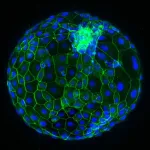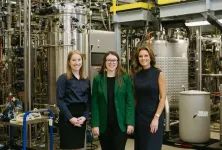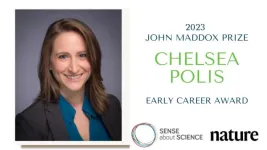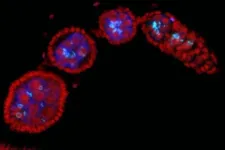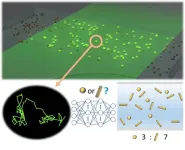(Press-News.org) The findings of a foundational UK public dialogue on human embryo research are published today, Wednesday 25th October 2023, as part of the Wellcome-funded Human Developmental Biology Initiative (HDBI). The HDBI is an ambitious scientific endeavour to advance our understanding of human development. The dialogue project, which was co-funded by UKRI Sciencewise programme, engaged a diverse group of the public to consider how early human embryo research can be used to its fullest, the 14-day rule and the fast-paced field of stem cell-based embryo models.
Headline findings include:
Appetite for review of the 14-day rule: Participants recognised that extending the 14-day rule could open up ways to achieve benefits in fertility and health, with participant support for reviewing this, including national discussion.
Confidence in regulation: There was a high level of confidence in how human embryo research is regulated, despite a low level of awareness of the regulators and statutes themselves. This included strong desire to see robust regulation governing any changes to the 14-day rule and further regulation for the use of stem cell-based embryo models.
Support for improved fertility and health outcomes: The strongest hopes for future human embryo research were where new knowledge would deliver improvements in understanding miscarriage, preventing health conditions such as spina bifida and raising the success rates of IVF procedures.
Concerns about genetically engineering humans: The public expressed concerns on the application of developments in this field to genetically alter or engineer humans.
The dialogue engaged a group of 70 people broadly reflective of the UK population in over 15 hours of activities including a series of online and face-to-face workshops with scientists, ethicists, philosophers, policy makers and people with relevant lived experience (such as embryo donors from IVF procedures).
Dr Peter Rugg-Gunn, scientific lead for the HDBI and senior group leader at the Babraham Institute, said: “Recent scientific advances bring incredible new opportunities to study and understand the earliest stages of human development. To ensure this research remains aligned with society’s values and expectations, we must listen and respond to public desires and concerns. This public dialogue is an important first step and as a scientist I am reassured by the findings but there is still a long way to go to fully understand this complex issue.”
The report is exceedingly timely, following notable scientific advances in human developmental biology presented at conferences and in leading scientific journals in recent months. As well as generating excitement in scientific fields and with the public, announcement of these breakthroughs also prompted some concerns and criticisms, with the view that these findings raised significant ethical issues. The dialogue provides insight into public considerations following deliberation on early human embryo research. The hope is that it will act as a foundational reference point that others in the sectors can build upon, such as in any future review of the law on embryo research.
Professor Robin Lovell-Badge, co-chair of the HDBI Oversight group, senior group leader and head of the Laboratory of Stem Cell Biology and Developmental Genetics at the Francis Crick Institute, said: “We have learnt a lot about human development before 14 days, but there are areas of investigation that could change how we understand development, and associated diseases, that lie beyond our current window of knowledge. Despite low awareness of current laws, members of the public quickly recognised many of the critical issues researchers are keenly aware of when it comes to growing embryos beyond the current limit. This dialogue also reinforced the fact that the public are in support of research that will yield better health outcomes, and in this case, increase the success of IVF procedures.
Other countries will be looking to the UK to see how we deal with the 14-day rule; we are not there yet with any mandate to make a change, but this does give a strong pointer. The next step will be to delve deeper into some of the topics raised through this dialogue as they apply to specific areas of research, as well as feeding into policy changes.”
The 14-day rule and the regulation of stem cell-based models
When considering the regulation of research involving human embryos, the dialogue explored participant’s views on the 14-day rule. Introduced in 1990, the 14-day rule is a limit enforced by statute in the UK. It applies to early human embryos that are donated by consent to research and embryos that are created for research from donated sperm and eggs. It limits the amount of time early human embryos can be developed in a laboratory for scientific study to 14 days after fertilisation. Due to technical advances, it is now possible to grow embryos in the lab past 14 days, but researchers are not allowed to by the law. If the law changed, it would open up this ‘black box’ of development with researchers able to investigate this crucial time in development from 14-28 days after fertilisation.
Professor Bobbie Farsides, co-chair of the HDBI Oversight group and Professor of Clinical and Biomedical Ethics at the Brighton and Sussex Medical School, said: “It has been a fascinating experience to support HDBI in the undertaking of this exercise. I commend the participants for the care and mutual respect they have shown throughout. Their engagement and commitment to a subject few of them had previously considered allowed for a wide range of views to be expressed and considered. I hope the scientists involved will be encouraged by the high level of interest in their work, and will want to keep the public conversation going around these important subjects.”
The dialogue included participant discussion on what a change to the 14-day rule might look like, and identified points that should be considered, such as defining what the benefits of extending the rule would be and potential mis-alignment with human embryo research regulations in other countries.
Participants acknowledged the astonishing possibilities of stem cell-based embryo models. The majority of participants would like to see these models further regulated. Work in establishing potential governance mechanisms is already underway. In recognition of the need for additional guidance and regulation in this area, the Cambridge Reproduction initiative launched a project in March 2023 to develop a governance framework for research using stem cell-based embryo models and to promote responsible, transparent and accountable research.
Future steps
A key outcome from the public dialogue is the identification of areas for further exploration, with participants proposing how future national conversations might be shaped. It is hoped that the project acts as a reference base for both widening engagement with the subject and also prompting deeper exploration of areas of concern.
Dr Michael Norman, HDBI Public Dialogue coordinator and Public Engagement Manager at the Babraham Institute, said: “This dialogue shows that people want the public to work closely with scientists and the government to shape both future embryo research legislation and scientific research direction. It is crucial that others in the sector build on these high quality, two-way engagement methodologies that allow for a genuine exchange of views and information to ensure that the public’s desires and concerns are listened to and respected. Transparency and openness around science is vital for public trust and through this we, as a society, can shape UK research in way that enriches the outcomes for all.”
Public Participant (Broad public group, south) said: “I do think that an extension of this public dialogue, and educating a wider society has a benefit in itself. This is really complex and sensitive and the wider you talk about it before decisions are made, the better.”
END
Public support for extending the 14-day rule on human embryo research indicated by foundational dialogue project
The dialogue findings provide an initial snapshot of public opinion on human embryo research, and that of stem cell embryo models, and aim to inform future public consultation, policy development and research governance.
2023-10-25
ELSE PRESS RELEASES FROM THIS DATE:
Edward Bluth awarded the Lawrence A. Mack Lifetime Achievement Award by Society of Radiologists in Ultrasound
2023-10-25
NEW ORLEANS, La.— Ochsner Health radiologist Edward Bluth, MD, FACR, was recently awarded the 2023 Lawrence A. Mack Lifetime Achievement Award in Washington D.C. by the Society of Radiologists in Ultrasound (SRU) for outstanding achievement in ultrasound research.
The Lawrence A. Mack Lifetime Achievement Award is the highest annual award given to a SRU member. The SRU, comprised of radiologists with expertise in ultrasound, works towards advancing science, practice and teaching of the specialty of ultrasound to ensure the professional fulfillment of radiologists performing ultrasound ...
Central Illinois named US Tech Hub for biomanufacturing by Biden-Harris administration
2023-10-25
URBANA, Ill. — President Joe Biden announced Monday that the Illinois Fermentation and Agriculture Biomanufacturing Hub (iFAB) is among 31 designated Regional Innovation and Technology Hubs (Tech Hubs) by the U.S. Economic Development Administration (EDA) — recognizing Central Illinois as a globally competitive center for innovation and job creation in biomanufacturing.
Led by the Integrated Bioprocessing Research Laboratory (IBRL) at the University of Illinois Urbana-Champaign, the iFAB consortium includes 30 partner organizations ...
Chelsea Polis awarded the 2023 John Maddox Prize
2023-10-25
Dr. Chelsea Polis, Senior Scientist of Epidemiology at the Center for Biomedical Research, has been selected as the Early Career winner of this year’s John Maddox Prize. The John Maddox Prize recognises individuals who stand up for science, despite hostility, to bring evidence to the public. Stories highlighted by the Maddox Prize show the harm done to society when sound scientific evidence and insights are not shared. The prize brings attention to the courage shown by individuals who take responsibility for helping society understand research evidence, and who encourage and inspire others ...
Bacteria can enhance host insect’s fertility with implications for disease control
2023-10-24
Mosquitoes and other insects can carry human diseases such as dengue and Zika virus, but when those insects are infected with certain strains of the bacteria Wolbachia, this bacteria reduces levels of disease in their hosts. Humans currently take advantage of this to control harmful virus populations across the world.
New research led at UC Santa Cruz reveals how the bacteria strain Wolbachia pipientis also enhances the fertility of the insects it infects, an insight that could help scientists increase the populations of mosquitoes that do not carry human disease.
“With insect population replacement approaches, they keep all the mosquitos and just add Wolbachia ...
Research Brief: U of M study suggests even more reasons to eat your fiber
2023-10-24
MINNEAPOLIS/ST. PAUL (10/24/2023) — Health professionals have long praised the benefits of insoluble fiber for bowel regularity and overall health. New research from the University of Minnesota suggests even more reasons we should be prioritizing fiber in our regular diets. In a new study published in Nutrients, researchers found that each plant source of insoluble fiber contains unique bioactives — compounds that have been linked to lower incidence of cardiovascular disease, cancer and Type 2 diabetes — offering potential health benefits beyond ...
Raining cats and dogs: research finds global precipitation patterns a driver for animal diversity
2023-10-24
Since the HMS Beagle arrived in the Galapagos with Charles Darwin to meet a fateful family of finches, ecologists have struggled to understand a particularly perplexing question: Why is there a ridiculous abundance of species some places on earth and a scarcity in others? What factors, exactly, drive animal diversity?
With access to a mammoth set of global-scale climate data and a novel strategy, a team from the Department of Watershed Sciences in Quinney College of Natural Resources and the Ecology Center identified several factors to help ...
SDMPH welcomes Charles Parks Richardson, MD
2023-10-24
Charles Parks Richardson, MD, has been elected as a Board Member of the Society for Disaster Medicine and Public Health.
Dr. Richardson is an American physician who is both an accomplished physician and a medical innovator. He has not only been the inventor of several medical devices and pharmaceutical processes but has translated these into successful business ventures in partnership with such prestigious organizations as the American Heart Association.
He is currently the CEO of Critical Medical Infrastructure (CMI), KRS Global Biotechnology, and GeneRx, ...
Deep learning solves long-standing challenges in identification of nanoparticle shape
2023-10-24
Innovation Center of NanoMedicine (iCONM; Center Director: Kazunori Kataoka; Location: Kawasaki, Japan) has announced with The University of Tokyo that a group led by Prof. Takanori Ichiki, Research Director of iCONM (Professor, Department of Materials Engineering, Graduate School of Engineering, The University of Tokyo), proposed a new property evaluation method of nanoparticles’ shape anisotropy that solves long-standing issues in nanoparticle evaluation that date back to Einstein's time. The paper, titled " Analysis of Brownian motion trajectories of non-spherical nanoparticles ...
Large, real-world study compares modern treatment options for pulmonary embolism (REAL.PE)
2023-10-24
SAN FRANCISCO – A large, modern real-world analysis published today in the Journal of the Society for Cardiovascular Angiography & Interventions (JSCAI), provides vital insights into the safety of novel therapies including ultrasound-assisted catheter-directed thrombolysis (USCDT) and mechanical thrombectomy (MT) that have been developed to address the increased morbidity and mortality of elevated risk pulmonary embolism (PE). Findings were presented today at TCT 2023.
Pulmonary embolism is a potentially life-threatening condition where a blood clot embolizes to the lungs, obstructing ...
NSF FABRIC project announces groundbreaking high-speed network infrastructure expansion
2023-10-24
The NSF-funded FABRIC project has completed installation of a unique network infrastructure connection, called the TeraCore—a ring spanning the continental U.S.—which boasts data transmission speeds of 1.2 Terabits per second (Tbps), or one trillion bits per second. FABRIC previously established preeminence with its cross-continental infrastructure, but the project has now hit another milestone as the only testbed capable of transmitting data at these speeds—the highest being twelve times faster than what was available ...
LAST 30 PRESS RELEASES:
Jeonbuk National University researchers develop an innovative prussian-blue based electrode for effective and efficient cesium removal
Self-organization of cell-sized chiral rotating actin rings driven by a chiral myosin
Report: US history polarizes generations, but has potential to unite
Tiny bubbles, big breakthrough: Cracking cancer’s “fortress”
A biological material that becomes stronger when wet could replace plastics
Glacial feast: Seals caught closer to glaciers had fuller stomachs
Get the picture? High-tech, low-cost lens focuses on global consumer markets
Antimicrobial resistance in foodborne bacteria remains a public health concern in Europe
Safer batteries for storing energy at massive scale
How can you rescue a “kidnapped” robot? A new AI system helps the robot regain its sense of location in dynamic, ever-changing environments
Brainwaves of mothers and children synchronize when playing together – even in an acquired language
A holiday to better recovery
Cal Poly’s fifth Climate Solutions Now conference to take place Feb. 23-27
Mask-wearing during COVID-19 linked to reduced air pollution–triggered heart attack risk in Japan
Achieving cross-coupling reactions of fatty amide reduction radicals via iridium-photorelay catalysis and other strategies
Shorter may be sweeter: Study finds 15-second health ads can curb junk food cravings
Family relationships identified in Stone Age graves on Gotland
Effectiveness of exercise to ease osteoarthritis symptoms likely minimal and transient
Cost of copper must rise double to meet basic copper needs
A gel for wounds that won’t heal
Iron, carbon, and the art of toxic cleanup
Organic soil amendments work together to help sandy soils hold water longer, study finds
Hidden carbon in mangrove soils may play a larger role in climate regulation than previously thought
Weight-loss wonder pills prompt scrutiny of key ingredient
Nonprofit leader Diane Dodge to receive 2026 Penn Nursing Renfield Foundation Award for Global Women’s Health
Maternal smoking during pregnancy may be linked to higher blood pressure in children, NIH study finds
New Lund model aims to shorten the path to life-saving cell and gene therapies
Researchers create ultra-stretchable, liquid-repellent materials via laser ablation
Combining AI with OCT shows potential for detecting lipid-rich plaques in coronary arteries
SeaCast revolutionizes Mediterranean Sea forecasting with AI-powered speed and accuracy
[Press-News.org] Public support for extending the 14-day rule on human embryo research indicated by foundational dialogue projectThe dialogue findings provide an initial snapshot of public opinion on human embryo research, and that of stem cell embryo models, and aim to inform future public consultation, policy development and research governance.
